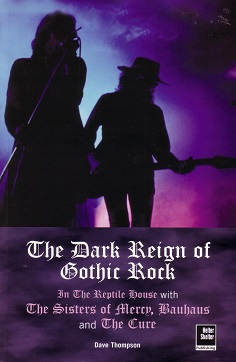
The Dark Reign of Gothic Rock
Dave Thompson
283 pages including chronology
published in 2002
The mark of a good book about any kind of music to me is if it makes me want to listen to the music it's about. In the case of The Dark Reign of Gothic Rock, I started listening to a lot more Bauhaus, Sisters of Mercy and Love and Rockets. Genre overviews are always hard to write, but Dave Thompson managed to do quite well, largely by sticking to the original wave of goth bands.
Gothic rock has always had a bit of a naff reputation, but in the early eighties, when bands like the Cure and Bauhaus started to develop the genre, it made sense as a logical extension of punk and post-punk. The use of synthesisers, dark lyrics and a sombre, depressing musical style fitted the times perfectly. This was after all at the height of the Cold War, when any moment could see the annihilation of human civilisation, while in the UK Thatcher was busy dismantling the welfare state and the country's industry while three million were already on the dole.
Of course goth rock didn't spring fully formed from Zeus' brow in 1982 and Dave Thompson does a good job showing some of the deep roots of the genre, as well as providing the context in which it came to fruition in the early eighties. He makes clear just where a post punk band like Joy Division, which had some of the elements that would pop up in gothic rock, differs from actual gothic bands. You may not always agree with him of course, but I don't think he made too many controversal choices.
That done, he sets out to follow the core goth bands through the eighties. There's of course the Cure and Bauhaus, as well as the successor projects once Bauhaus ended, not to mention The Mission and the Sisters of Mercy. Beside those, there are also slightly lesser known bands like The Birthday Party, Gene Loves Jezebel, Love and Rockets, Red Lorry Yellow Lorry and Alien Sex Fiend, amongst others. Perhaps the most controversial inclusion here might be Southern Death Cult/The Cult, which did start out Gothic but may be judged not to stay Gothic. Personally I don't mind their inclusion as I would've done the same myself.
For somebody like me, fond of Gothic music but not that knowledgeable about the genre or its history, this was an interesting introduction, but I can see that it was no more than that. Thompson's decision to largely stick to the British Gothic bands of the eighties and not look further means that a lot hasn't been covered, but also gave this book a coherence it might otherwise have lacked.
Webpage created 29-01-2013, last updated 03-02-2014.